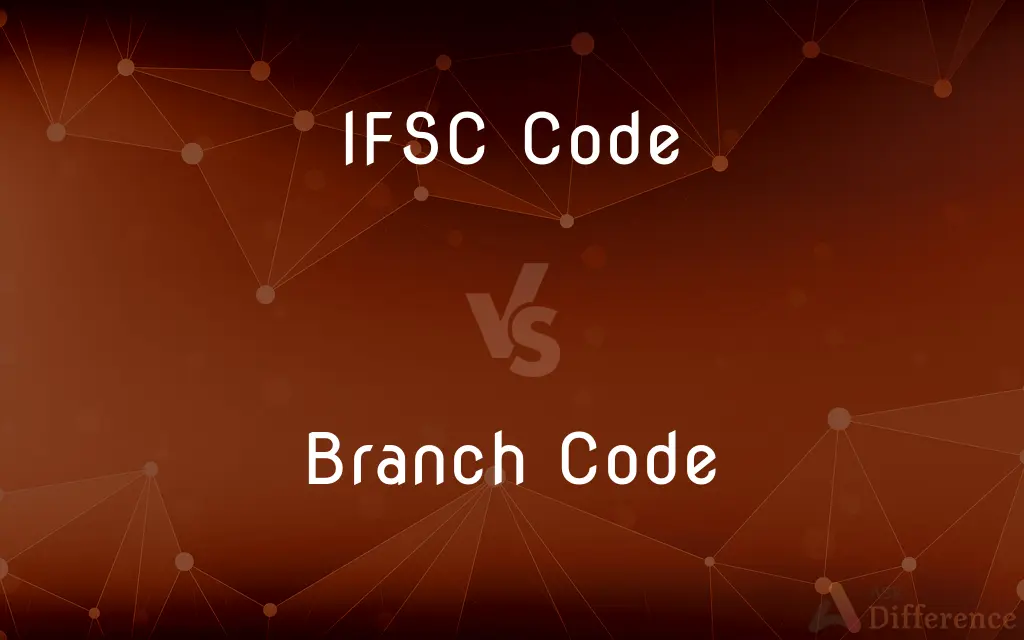IFSC Code vs. Branch Code — What's the Difference?
Edited by Tayyaba Rehman — By Fiza Rafique — Published on November 2, 2023
IFSC Code is a unique alphanumeric code identifying a specific bank branch in India for electronic transfers. Branch Code is a numeric code identifying a specific branch within a bank. Both are crucial for banking operations, but IFSC is broader in scope.

Difference Between IFSC Code and Branch Code
Table of Contents
ADVERTISEMENT
Key Differences
IFSC Code is an acronym for Indian Financial Systems Code. It's an essential tool used in India's electronic fund transfer, including NEFT and RTGS. On the other hand, the Branch Code is a specific number allocated to each branch of a bank, helping to identify it within that bank's network.
Every bank branch in India that participates in inter-bank electronic transfers has a unique IFSC Code. This code not only signifies the bank's name but also the branch, ensuring that funds are transferred to the correct location. Conversely, Branch Code is purely a local identifier and does not incorporate the bank's name or other details.
In practical use, when sending money electronically across banks in India, the IFSC Code becomes crucial as it helps route the funds to the right bank and branch. However, when dealing with transactions or operations within the same bank, the Branch Code might be sufficient to identify the specific branch.
Both the IFSC Code and the Branch Code serve the purpose of identification. While the IFSC Code is more comprehensive, offering a unique identification for every bank branch involved in electronic transactions in India, the Branch Code operates on a smaller scale, providing identification within a particular bank's network.
Comparison Chart
Composition
Alphanumeric (Letters and Numbers)
Typically Numeric
ADVERTISEMENT
Scope of Identification
Bank and Branch
Branch only
Geographical Application
Specific to India
Used globally in banks
Length
Usually 11 characters
Varies by bank
Primary Use
Electronic fund transfers
Local branch identification
Compare with Definitions
IFSC Code
An identifier for bank branches participating in NEFT and RTGS in India.
Without the IFSC Code, electronic money transfers might go astray.
Branch Code
A number assigned to identify a specific branch of a bank.
Knowing the Branch Code helps when filling out deposit slips for a particular branch.
IFSC Code
A combination of letters and numbers representing a bank branch for electronic transfers in India.
The first four characters of the IFSC Code represent the bank's name.
Branch Code
A local identifier for differentiating between branches within a bank's network.
The Branch Code is often used for internal bank transactions.
IFSC Code
An alphanumeric code unique to each bank branch in India.
The IFSC Code is essential for electronic fund transfers in India.
Branch Code
A series of numbers used for local identification within a bank's system.
Branch Codes ensure clarity when banks have multiple branches in the same city.
IFSC Code
A code used in India to identify a specific bank branch for electronic transactions.
Ensure you have the correct IFSC Code before initiating a NEFT transfer.
Branch Code
A code that aids in differentiating branches of a bank in a specific region.
For local queries, knowing the Branch Code can expedite the process.
IFSC Code
A code that aids in the accurate transfer of funds between banks in India.
Always double-check the IFSC Code when setting up a beneficiary for wire transfers.
Branch Code
A numeric code distinguishing one bank branch from another within the same bank.
I need the Branch Code to set up an internal transfer within my bank.
Common Curiosities
What does IFSC Code stand for?
IFSC Code stands for Indian Financial Systems Code.
Does every bank branch have a unique Branch Code?
Yes, each branch within a bank has a distinct Branch Code.
What is the primary use of the Branch Code?
Branch Code is used for identifying a specific branch within a bank's network.
Can I find a bank's IFSC Code online?
Yes, most banks provide their IFSC Codes on their websites or through the Reserve Bank of India's website.
Is the Branch Code the same for all branches of a bank?
No, each branch has a unique Branch Code.
Where can I find the Branch Code of my bank?
Branch Codes are often available on bank statements, passbooks, or directly from the bank.
Why is the IFSC Code important for electronic transfers?
The IFSC Code ensures that funds are directed to the correct bank and branch during electronic transfers.
Can I transfer money without the recipient's IFSC Code?
No, the IFSC Code is essential for inter-bank electronic money transfers in India.
Can two bank branches have the same IFSC Code?
No, every bank branch participating in electronic transfers has a unique IFSC Code.
Is the IFSC Code used outside of India?
No, the IFSC Code is specific to India.
How many characters does a typical Branch Code have?
The number of characters in a Branch Code varies by bank but is typically 3-6 digits long.
Does every bank in India have an IFSC Code?
Only banks participating in electronic transfers like NEFT and RTGS have IFSC Codes.
How often do Branch Codes change?
Branch Codes typically remain constant unless a branch is merged or restructured.
What do the initial characters of the IFSC Code represent?
The first four characters of the IFSC Code typically represent the bank's name.
Are Branch Codes and Sort Codes the same?
No, while both are used for bank branch identification, Sort Codes are more common in countries like the UK, while Branch Codes are used more broadly.
Share Your Discovery

Previous Comparison
Hard Work vs. Smart Work
Next Comparison
Bromethalin vs. DiphacinoneAuthor Spotlight
Written by
Fiza RafiqueFiza Rafique is a skilled content writer at AskDifference.com, where she meticulously refines and enhances written pieces. Drawing from her vast editorial expertise, Fiza ensures clarity, accuracy, and precision in every article. Passionate about language, she continually seeks to elevate the quality of content for readers worldwide.
Edited by
Tayyaba RehmanTayyaba Rehman is a distinguished writer, currently serving as a primary contributor to askdifference.com. As a researcher in semantics and etymology, Tayyaba's passion for the complexity of languages and their distinctions has found a perfect home on the platform. Tayyaba delves into the intricacies of language, distinguishing between commonly confused words and phrases, thereby providing clarity for readers worldwide.













































